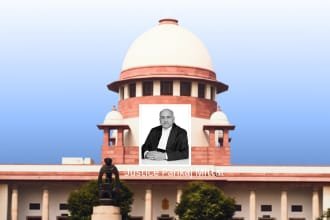The Delhi High Court has cancelled the bail of a man accused of repeatedly raping his minor daughter and forcing her to watch pornographic videos. The judgment, delivered by Justice Neena Bansal Krishna, highlights the seriousness with which courts must approach bail in cases under the Protection of Children from Sexual Offences Act (POCSO Act). The Court termed the conduct of the father as “perverse and shocking” and observed that granting bail at such an early stage of investigation was “erroneous and unjustified.”
This decision not only provides relief to the survivor but also serves as an important precedent, reminding trial courts of the need for a survivor-centric approach in heinous offences involving children.
Background of the Case
The accused man was alleged to have committed sexual abuse against his daughter from when she was around 10 years old, continuing for nearly six years. The abuse included:
- Inappropriate touching,
- Compelling the child to watch pornography, and
- Rape.
The survivor revealed the ordeal to her therapist in 2021 and later confided in her mother, who approached the police. The accused was charged under provisions of the Indian Penal Code (IPC) and the POCSO Act, 2012.
Surprisingly, within just nine days of the FIR being registered, the trial court granted him bail. This prompted the survivor, through her counsel, to appeal before the Delhi High Court.
High Court’s Observations
Justice Neena Bansal Krishna found the trial court’s decision granting bail to be fundamentally flawed. The Court made several critical observations:
- Grave Breach of Trust
A father, who holds the “pious duty” of ensuring his daughter’s safety, becoming the perpetrator of such offences was the “most shocking and perverse” act. - Corroborating Evidence
The child’s allegations that her father forced her to watch pornography were supported by the Forensic Science Laboratory (FSL) report, which confirmed obscene videos on the father’s mobile phone. - Premature Bail
Granting bail within nine days of FIR registration, while investigation was still ongoing, was “completely misplaced.” - Failure to Consider Survivor’s Trauma
The trial court overlooked the severe psychological trauma suffered by the child survivor in its rush to grant bail.
The Court concluded that the bail order was “perverse and unjustified” and set it aside.
Defence Arguments Rejected
The accused attempted to claim that:
- The allegations were fabricated to strengthen his wife’s position in a parallel matrimonial dispute.
- There was a delay in filing the complaint.
However, the High Court rejected these submissions, noting that:
- Survivors of child sexual abuse often delay reporting due to fear, intimidation, or threats. In this case, the girl was threatened that her mother would be harmed if she spoke up.
- Matrimonial disputes cannot dilute the gravity of the offences alleged.
Thus, the Court dismissed the defence as insufficient to justify bail.
Legal Provisions Involved
1. Indian Penal Code (IPC)
The accused was charged with provisions relating to rape, sexual assault, and criminal intimidation.
2. Protection of Children from Sexual Offences Act, 2012 (POCSO Act)
The POCSO Act is designed to protect minors from sexual assault, sexual harassment, and pornography. It imposes strict punishments and provides for child-friendly procedures in trial and investigation.
The case is a textbook example of how POCSO Act provisions are triggered in situations of prolonged and aggravated abuse by a parent.
Why Cancelling Bail Was Crucial
The High Court’s intervention was necessary for several reasons:
- Protection of the Survivor: Granting bail at such an early stage could have exposed the survivor to intimidation.
- Integrity of Investigation: With the accused out on bail, evidence could have been tampered with or witnesses influenced.
- Seriousness of the Offence: Crimes involving sexual assault of minors require stricter judicial scrutiny.
- Message to Lower Courts: Bail orders in cases of heinous crimes must be passed with sensitivity and caution.
By cancelling the bail, the Court ensured that justice was not compromised at the cost of expediency.
Broader Judicial Approach to Bail in Heinous Offences
Indian courts generally follow the principle that “bail is the rule, jail is the exception.” However, in cases involving heinous offences like rape of minors, exceptions must be carved out.
The Supreme Court and various High Courts have repeatedly emphasized that:
- The gravity of the offence and its impact on the survivor must weigh heavily in bail considerations.
- Premature bail can undermine the survivor’s confidence in the justice system.
- Protection of victims and witnesses is paramount, especially when the accused holds power or authority over the victim.
This Delhi High Court judgment falls squarely within this judicial philosophy.
Broader Implications of the Ruling
- Survivor-Centric Approach
The judgment reinforces that child survivors’ voices and trauma must be central to bail considerations. - Message to Trial Courts
Trial courts must not grant bail mechanically or in haste, particularly when investigation is pending. - Strengthening POCSO Enforcement
The order demonstrates the judiciary’s resolve to strictly enforce the POCSO Act and deter offenders. - Encouragement to Survivors
By setting aside the bail order, the Court reassures survivors that the legal system stands firmly by them.
Conclusion
The Delhi High Court’s cancellation of bail in this case marks a significant development in the jurisprudence surrounding child sexual abuse and bail under the POCSO Act.
Justice Neena Bansal Krishna’s strong remarks highlight the betrayal of trust when a father abuses his own daughter and reaffirm the judiciary’s commitment to child protection. The ruling also sends a clear message to trial courts: bail in such cases cannot be granted casually, especially when investigations are incomplete.
This decision stands as an important precedent in ensuring that perpetrators of child sexual abuse cannot exploit legal loopholes to evade accountability. It strengthens the justice system’s role as a protector of children and upholds the principle that no procedural convenience can outweigh the safety and dignity of survivors.
Also Read


